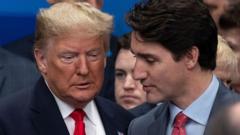This website uses cookies so that we can provide you with the best user experience possible. Cookie information is stored in your browser and performs functions such as recognising you when you return to our website and helping our team to understand which sections of the website you find most interesting and useful.


Prime Minister Justin Trudeau said he had an "excellent conversation" with US President-elect Donald Trump, after the two leaders met at Trump's Florida estate Mar-a-Lago.
Trudeau travelled to West Palm Beach as Canada seeks to head off the president-elect's threat to impose a 25% tariff on Canadian goods, a source has confirmed to the BBC.
Canadian media reported that Trudeau landed in Palm Beach International Airport on Friday evening to visit Trump at his Mar-a-Lago estate.
The two spoke by phone earlier in the week after Trump announced that, upon taking office in January, he would slap an across-the-board tariff on all products entering the US from Mexico and Canada.
Neither the prime minister's office nor Trump's team have responded to the BBC's request for comment on the visit.
Leaving his hotel in Palm Beach on Saturday morning, Trudeau ignored questions from reporters about whether he and Trump had discussed potential tariffs.
The trip was not included on Trudeau's public itinerary for Friday.
Trump has been at his Mar-a-Lago estate meeting with his transition team. Trudeau is reported to be the first G7 leader to visit the president-elect since the election.
The two men reportedly had dinner, alongside Trump's pick for commerce secretary Howard Lutnick and Canada's public safety minister Dominic LeBlanc.
Trudeau has often underscored that the two countries were able to successfully renegotiate a major trade pact during Trump's first term, though the relationship between the two leaders has occasionally been rocky.
On Friday, speaking at an event in Prince Edward Island, Trudeau said the two countries "rolled up our sleeves and were able to create jobs on both sides of the border".
He said looked forward to having many "great" conversations with Trump.
The Florida visit is the latest move by Canada as it seeks to avoid the hefty tariffs, which could have wide-reaching economic impacts.
It remains unclear whether the incoming Trump administration will actually move ahead with the threatened tariffs, as analysts note that the president-elect has been known to use such threats in the past as a negotiating tactic to achieve his goals.
Trump - who has also threatened the same levy against Mexico - has signalled that they would remain in place until both countries work to secure their shared borders with the US.
Trudeau said on Friday that "when Trump makes statements like that, he plans on carrying them out".
He said his goal was to point out the tariff would not just harm Canadians but also raise prices for Americans and hurt that country's economy.
Trudeau was accompanied on the trip by Dominic LeBlanc, the minister in charge of border security.
US media reported that Trudeau and Trump were joined at dinner by Howard Lutnick, Trump's nominee for commerce secretary; Doug Burgum, tapped to lead the Department of the Interior; and Mike Waltz, who has been selected as the next national security adviser.
Canada is one of America's largest trading partners and it sends about 75% of its total exports to the US. The two countries also share deeply integrated supply chains.
After the phone call with Trump, Trudeau held an emergency meeting on Wednesday with the leaders of Canada's provinces and territories over how to manage the US-Canada relationship.
Trudeau is promising to present a united "Team Canada" approach to working with the US to make the case against the levy.
Several leaders of Canadian provinces have criticised Trump's plan, saying it would be devastating to the country's economy, including the oil and gas and automotive industries.
Mexican President Claudia Sheinbaum also had a phone call with Trump this week.
The number of crossings at the US-Canada border is significantly lower than that at the southern border, according to US Border Patrol data on migrant encounters.
During the 2024 fiscal year, there were around 23,700 apprehensions at the northern land border, while the southern border saw more than 1.53 million apprehensions.
But Canadian officials have said in recent days there is still joint work to be done to improve border security.



 Africana55 Radio
Africana55 Radio 
